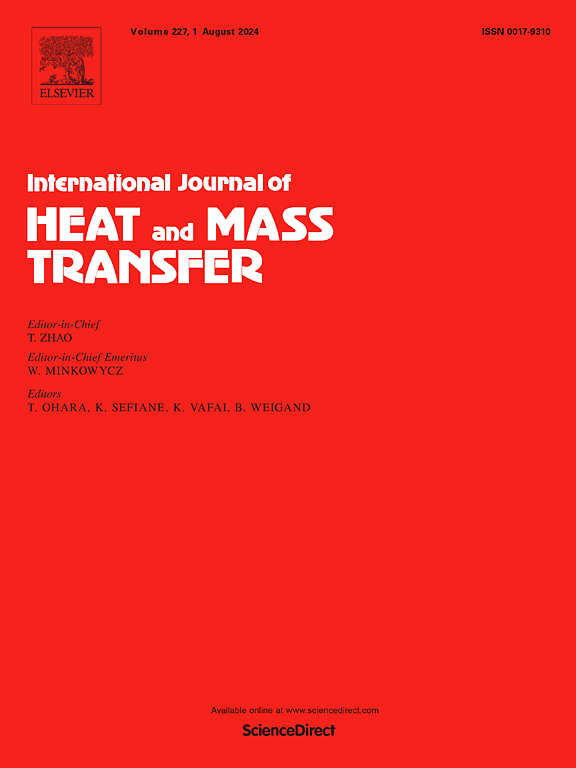A new implicit formulation of the enthalpy method using flag updates
IF 5
2区 工程技术
Q1 ENGINEERING, MECHANICAL
International Journal of Heat and Mass Transfer
Pub Date : 2025-05-13
DOI:10.1016/j.ijheatmasstransfer.2025.127166
引用次数: 0
Abstract
In the computation of problems involving phase changes, numerical approaches formulated on enthalpy offer numerous advantages to ‘front-tracking’ methods where the moving boundary between phases is explicitly tracked. However, due to the piecewise definition of enthalpy, such formulations effectively insert additional nonlinearity into the governing equations, thus adding increased complexity to implicit time-evolution schemes. In this paper, we develop and present a new ‘flag-update’ enthalpy method that crucially results in a linear set of equations at each time step. The equations can then be formulated as a sparse linear system, and subsequently solved using a more efficient inversion process. In a detailed error analysis, and via benchmarking on the classic Stefan problem in 1D and 2D, we show that the flag-update scheme is significantly faster than traditional implicit (Gauss–Seidel SOR) methods. However, speedup does not persist in 3D due to the significant memory and storage manipulations required. This study highlights the need to develop rigorous numerical analysis thresholds on such schemes.
一种新的使用标志更新的焓法隐式公式
在涉及相变问题的计算中,基于焓的数值方法与明确跟踪相间移动边界的“前跟踪”方法相比具有许多优点。然而,由于焓的分段定义,这种公式有效地将额外的非线性插入到控制方程中,从而增加了隐式时间演化方案的复杂性。在本文中,我们开发并提出了一种新的“标志更新”焓法,该方法在每个时间步长都能得到一组线性方程。然后可以将方程表述为一个稀疏线性系统,然后使用更有效的反演过程求解。在详细的误差分析中,通过对一维和二维经典Stefan问题的基准测试,我们表明标志更新方案比传统的隐式(高斯-塞德尔SOR)方法要快得多。然而,由于需要大量的内存和存储操作,加速在3D中不会持续存在。这项研究强调需要对这类方案制定严格的数值分析门槛。
本文章由计算机程序翻译,如有差异,请以英文原文为准。
求助全文
约1分钟内获得全文
求助全文
来源期刊
CiteScore
10.30
自引率
13.50%
发文量
1319
审稿时长
41 days
期刊介绍:
International Journal of Heat and Mass Transfer is the vehicle for the exchange of basic ideas in heat and mass transfer between research workers and engineers throughout the world. It focuses on both analytical and experimental research, with an emphasis on contributions which increase the basic understanding of transfer processes and their application to engineering problems.
Topics include:
-New methods of measuring and/or correlating transport-property data
-Energy engineering
-Environmental applications of heat and/or mass transfer

 求助内容:
求助内容: 应助结果提醒方式:
应助结果提醒方式:


